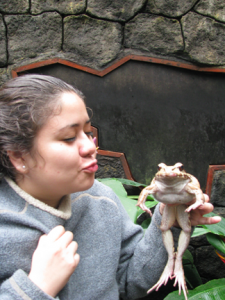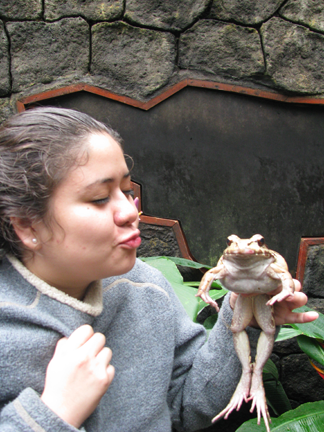By Victoria Barry/reporter
TCC students can gain college credit studying Spanish in Costa Rica this summer.
The program, coordinated by NW Spanish instructor Alejandro Garza lasts four weeks. Participants will leave in May and return in June.

Photo courtesy Alejandro Garza
“Students learn cultural aspects of Hispanic culture,” Garza said. “They learn not only the language but also the economics.”
Aviel Vega, who is pursuing a degree in international business, went on the trip last year.
“I primarily had a particular interest in observing the methods of conducting business in a Latin country,” she said.
Adriana Oronia, a member of Garza’s Spanish I class last spring, said she was hesitant after the first mention of the course but became interested after hearing more about the trip from Garza.
“I was encouraged to take a chance and become adventurous,” she said. “I had never participated in a study abroad program, but it was definitely one of my goals in life. Therefore, this was my opportunity.”
Students develop a special bond during the trip, Garza said. After they return, they get together to talk about their experiences and share pictures.
Vega remembers the hike up Cerro Chato volcano in Monteverde.
“The two-and-a-half hour hike to the top of the extinct volcano consisted of us climbing through the lush green terrain with a spectacular view,” he said. “The Costa Rica trip gave me a new perspective and appreciation for the opportunities we are given here in the States.”
Oronia also had a positive reaction.
“It has been the best experience of my life,” she said. “I would definitely recommend you take a raincoat or at least take a really big umbrella.”
The deadline to register is March 1. Students will earn credit for both Intermediate Spanish I and II from the Universidad Latina (or ULatina). The credits earned in Costa Rica are transferable to TCC.
Students who want to enroll should contact Garza at alejandro.garza@tccd.edu. The program initially costs $2,400.
“The program includes tuition and registration costs for classes at the Universidad Latina de Costa Rica,” according to Sol Education Abroad’s webpage. The company organizes the program, and its site is linked from TCC’s Web page for the Costa Rica Study Abroad Program.
That cost also includes housing, and students will stay in the home of a local host family.
“The first day in Costa Rica exceeded my expectations,” Vega said. “I assumed that we would have some awkward moments with my host family. However, my Tican family could not have been any better of a host.”
Sol Education Abroad’s website indicates the host families are carefully chosen and have experience as host families. Usually, two students are placed per home, and the host families provide three meals per day.
Airfare will cost an extra $600 for group flights arranged by Sol Education Abroad. Ground transportation to and from the airport in Costa Rica is included. Students will also need a passport to go on the trip, and that fee is not included in the cost.
Garza has run the program for three years. Before that, he worked with other colleges with study abroad programs. One of his favorite spots in Costa Rica is a beautiful, huge waterfall near Arenal volcano.
”The best view of it is when you jump in and look up,” he said.

